
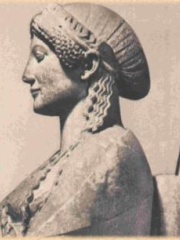
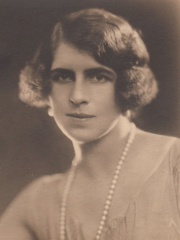
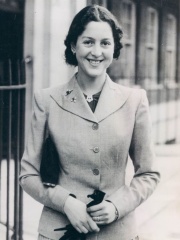
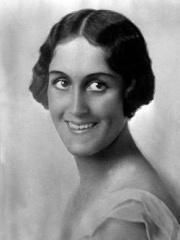
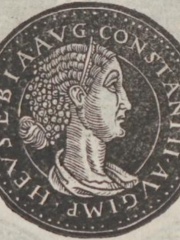
The Most Famous
COMPANIONS from Greece
This page contains a list of the greatest Greek Companions. The pantheon dataset contains 784 Companions, 7 of which were born in Greece. This makes Greece the birth place of the 19th most number of Companions behind Hungary, and India.
Top 7
The following people are considered by Pantheon to be the most legendary Greek Companions of all time. This list of famous Greek Companions is sorted by HPI (Historical Popularity Index), a metric that aggregates information on a biography's online popularity.

1. Nurbanu Sultan (1525 - 1583)
With an HPI of 81.39, Nurbanu Sultan is the most famous Greek Companion. Her biography has been translated into 47 different languages on wikipedia.
Nurbanu Sultan (Ottoman Turkish: نور بانو سلطان; c. 1525 – 7 December 1583) was Haseki Sultan of the Ottoman Empire and legal wife of Ottoman Sultan Selim II (r. 1566–1574), She served as Valide Sultan from 1574 until her death in 1583 as mother to Ottoman Sultan Murad III (r. 1574–1595). She was one of the most prominent figures during the time of the Sultanate of Women.

2. Gorgo, Queen of Sparta (506 BC - 500 BC)
With an HPI of 70.31, Gorgo, Queen of Sparta is the 2nd most famous Greek Companion. Her biography has been translated into 30 different languages.
Gorgo (; Greek: Γοργώ [ɡorɡɔ͜ɔ́]; fl. 480 BC) was a Spartan woman and wife to King Leonidas I (r. 489–480 BC). She was the daughter and the only known child of Cleomenes I, Leonidas' half-brother and King of Sparta (r. 520–490 BC). Gorgo was also the mother of King Pleistarchus, her only son with King Leonidas I. She is notably one of the few female historical figures actually named by Herodotus, and is depicted in sources as intelligent and wise. Her birth date is uncertain, but based on Herodotus' dating, it is most likely to have been between 518 and 508 BC.

3. Helen of Greece and Denmark (1896 - 1982)
With an HPI of 68.16, Helen of Greece and Denmark is the 3rd most famous Greek Companion. Her biography has been translated into 36 different languages.
Helen of Greece and Denmark (Greek: Ελένη, romanized: Eléni; Romanian: Elena; 2 May 1896 – 28 November 1982) was the queen mother of Romania during the reign of her son King Michael I (1940–1947). Her humanitarian efforts to save Romanian Jews during World War II led to her being awarded by the State of Israel with the honorific of Righteous Among the Nations in 1993. Daughter of King Constantine I of Greece and his wife, Princess Sophia of Prussia, Helen spent her childhood in Greece, the United Kingdom and Germany. The outbreak of World War I and the overthrow of her father by the Allies in 1917 permanently marked her and also separated her from her favorite brother, the young Alexander I of Greece. Exiled in Switzerland along with most members of the royal family, Helen then spent several months caring for her father, plagued by disease and depression. In 1920, the princess met Carol, Crown Prince of Romania, who quickly asked her hand in marriage. Despite the bad reputation of the prince, Helen accepted and moved to Romania, where she soon gave birth to their only son, Prince Michael, in 1921. The situation of her family, however, continued to worry Helen, who made several trips abroad to visit her parents when they did not simply reside with her in Bucharest. In doing this, she distanced herself from her husband, whose multiple affairs ended when he fell in love with Magda Lupescu in 1924. Finally, in 1925, Crown Prince Carol abandoned his wife and renounced the throne in order to live openly with his mistress. Distraught, Helen tried to persuade her husband to return to her but eventually she accepted the divorce in 1928. In the meanwhile, Helen was proclaimed "Queen Mother of Romania" in 1927, as her son Michael ascended to the throne under the regency of his uncle Prince Nicolae. However, the political situation in Romania was complicated and Carol took advantage of the increased instability to return to Bucharest in 1930 and be acclaimed as king. Soon, the new ruler forced his ex-wife into exile and only authorized her to see their son two months per year. In these circumstances, Helen moved to Villa Sparta at Fiesole, Tuscany. Always close to her family, she hosted her sisters Irene and Katherine and brother Paul, who stayed with her intermittently until the restoration of the Greek monarchy in 1935. The outbreak of World War II, the deposition of Carol II and the subsequent dismemberment of Greater Romania in 1940, however, brought Helen back to be with her son in Bucharest. Subject to the dictatorship of General Antonescu and vigilance of Nazi Germany, the king and his mother were cautious in their dealings with the fascist regime. They did not show their opposition to the participation of Romania in the invasion of the Soviet Union and the deportation of Jews. Finally, King Michael organized a coup against Antonescu on 23 August 1944 and Romania turned against the Axis powers; however, the country was, in the end, occupied by the Red Army. For Helen and her son, the post-war period was marked by the interference of the Soviet Union in Romanian political life. In March 1945, the king was forced to accept a communist government headed by Petru Groza while the following year, the rigged general elections confirmed the hegemony of the PCR in the country. Finally, Michael I was forced to abdicate on 30 December 1947 and the royal family took the path of exile. She then returned to the Villa Sparta, where she divided her time among her family, gardening and the study of Italian art. Increasingly concerned about her finances, Helen finally left Italy for Switzerland in 1979 and died three years later with her son at her side.

4. Alexandra of Yugoslavia (1921 - 1993)
With an HPI of 67.94, Alexandra of Yugoslavia is the 4th most famous Greek Companion. Her biography has been translated into 35 different languages.
Alexandra (Greek: Αλεξάνδρα, romanized: Alexándra, Serbo-Croatian: Александра/Aleksandra, in 1922 retroactively recognised as Princess Alexandra of Greece and Denmark; 25 March 1921 – 30 January 1993) was the last Queen of Yugoslavia as the wife of King Peter II. Posthumous daughter of King Alexander of Greece and his morganatic wife, Aspasia Manos, Alexandra was not part of the Greek royal family until July 1922 when, at the behest of Queen Sophia, Alexander's mother, a law was passed which retroactively recognized marriages of members of the royal family, although on a non-dynastic basis; in consequence, she obtained the style and name of Her Royal Highness Princess Alexandra of Greece and Denmark. At the same time, a serious political and military crisis, linked to the defeat of Greece by Turkey in Anatolia, led to the deposition and exile of the royal family, beginning in 1924. Being the only members of the dynasty allowed to remain in the country by the Second Hellenic Republic, the princess and her mother later found refuge in Italy with Dowager Queen Sophia. After three years with her paternal grandmother, Alexandra left Florence to continue her studies in the United Kingdom, while her mother settled in Venice. Separated from her mother, the princess fell ill, forcing Aspasia to make her leave the boarding school where she was studying. After the restoration of her uncle, King George II, on the Hellenic throne in 1935, Alexandra stayed in her native country several times but the outbreak of the Greco-Italian War, in 1940, forced her and her mother to settle in Athens. The invasion of Greece by the Axis powers in April–May 1941, however, led to their moving to the United Kingdom. Again exiled, Alexandra met in London the young King Peter II of Yugoslavia, who also went into exile after the invasion of his country by the Germans. Quickly, Alexandra and Peter II fell in love and planned to marry. Opposition from both Peter's mother, Maria, and the Yugoslav government in exile forced the couple to delay their marriage plans until 1944, when they finally celebrated their wedding. A year later, Alexandra gave birth to her only son, Alexander, Crown Prince of Yugoslavia. However, the happiness of the family was short-lived: on 29 November 1945, Marshal Tito proclaimed the Socialist Federal Republic of Yugoslavia and Alexandra, who had never set foot in her adopted country, was left without a crown. The abolition of the Yugoslav monarchy had very serious consequences for the royal couple. Penniless and unable to adapt to the role of citizen, Peter II turned to alcoholism and multiple affairs with other women. Depressed by the behavior of her husband, Alexandra neglected her son and made several suicide attempts. After the death of Peter II in 1970, Alexandra's health continued to deteriorate. She died of cancer in 1993. Her remains were buried in the Royal Cemetery Plot in the park of Tatoi, in Greece, before being transferred to the Royal Mausoleum of Oplenac in 2013.
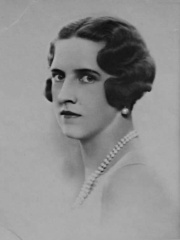
5. Princess Irene, Duchess of Aosta (1904 - 1974)
With an HPI of 66.20, Princess Irene, Duchess of Aosta is the 5th most famous Greek Companion. Her biography has been translated into 30 different languages.
Princess Irene of Greece and Denmark, Duchess of Aosta (Greek: Πριγκίπισσα Ειρήνη της Ελλάδας και Δανίας; 13 February 1904 – 15 April 1974) was the fifth child and second daughter of King Constantine I of Greece and his wife, the former Princess Sophie of Prussia (sister of Kaiser Wilhelm II of Germany). She was a member of the Royal Families of Greece and Italy. From 1941 to 1943, she was also officially Queen Consort of Croatia.

6. Aspasia Manos (1896 - 1972)
With an HPI of 64.69, Aspasia Manos is the 6th most famous Greek Companion. Her biography has been translated into 27 different languages.
Aspasia Manou (Greek: Ασπασία Μάνου; 4 September 1896 – 7 August 1972) was a Greek aristocrat who became the wife of Alexander I, King of Greece. Due to the controversy over her marriage, she was styled Madame Manou instead of "Queen Aspasia", until recognized as Princess Aspasia of Greece and Denmark after Alexander's death and the restoration of King Constantine I, on 10 September 1922. Through her marriage, she and her descendants were some of the only ethnically Greek members of the Greek royal family, which originated in Denmark. Daughter of Colonel Petros Manos, aide-de-camp to King Constantine I of Greece, and Maria Argyropoulos (Petros Manos and Maria Argyropoulos were both descendants of most prominent Greek Phanariote families of Constantinople and descendants of ruling Princes of Transylvania, Wallachia, Moldavia and the Byzantine Empire).Aspasia grew up close to the royal family. After the divorce of her parents, she was sent to study in France and Switzerland. She returned to Greece in 1915 and met Prince Alexander, to whom she became secretly engaged due to the expected refusal of the royal family to recognize the relationship of Alexander I with a woman who did not belong to one of the European ruling dynasties. Meanwhile, the domestic situation in Greece was complicated by World War I. King Constantine I abdicated in 1917 and Alexander was chosen as sovereign. Separated from his family and subjected to the Prime Minister Eleftherios Venizelos, the new ruler found comfort in Aspasia. Despite the opposition of his parents (exiled in Switzerland) and Venizelists (who wanted the king to marry a British princess), King Alexander I secretly married Aspasia on 17 November 1919. The public revelation of the wedding shortly after caused a huge scandal, and Aspasia temporarily left Greece. However, she was reunited with her husband after a few months of separation and was then allowed to return to Greece without receiving the title of Queen of the Hellenes. She became pregnant, but Alexander died on 25 October 1920, less than a year after their marriage. At the same time, the situation in Greece was deteriorating again: the country was in the middle of a bloody conflict with the Ottoman Empire, Constantine I was restored (19 December 1920) only to be deposed again (27 September 1922), this time in favor of Diadochos (Crown Prince) George. Initially excluded from the royal family, Aspasia was gradually integrated after the birth of her daughter Alexandra on 25 March 1921 and was later recognized with the title of Princess Alexander of Greece and Denmark after a decree issued by her father-in-law. Nevertheless, her situation remained precarious due to the dislike of her sister-in-law Elisabeth of Romania and the political instability of the country. As the only members of the royal family to be allowed to stay in Greece after the proclamation of the Republic on 25 March 1924, Aspasia and her daughter chose to settle in Florence, with Queen Sophia. They remained there until 1927 then divided their time between the United Kingdom and Venice. The restoration of the Greek monarchy in 1935 did not change Aspasia's life. Sheltered by her in-laws, she made the Venetian villa Garden of Eden her main residence, until the outbreak of the Greco-Italian War in 1940. After a brief return to her country, where she worked for the Red Cross, the princess spent World War II in England. In 1944, her daughter married the exiled King Peter II of Yugoslavia, and Aspasia became a grandmother with the birth of Alexander, Crown Prince of Yugoslavia in 1945. Once peace was restored, Aspasia returned to live in Venice. Her last days were marked by economic hardship, illness and especially worry for her daughter, who made several suicide attempts. Aspasia died in 1972, but it was not until 1993 that her remains were transferred to the royal necropolis of Tatoi.

7. Eusebia (400 - 360)
With an HPI of 61.68, Eusebia is the 7th most famous Greek Companion. Her biography has been translated into 16 different languages.
Eusebia (Greek: Εύσεβία, died before 361) was Roman empress as the second wife of Roman emperor Constantius II. The main sources for the knowledge about her life are Julian's panegyric "Speech of Thanks to the Empress Eusebia", as well as several remarks by the historian Ammianus Marcellinus.
People
Pantheon has 7 people classified as Greek companions born between 506 BC and 1921. Of these 7, none of them are still alive today. The most famous deceased Greek companions include Nurbanu Sultan, Gorgo, Queen of Sparta, and Helen of Greece and Denmark.
Deceased Greek Companions
Go to all RankingsNurbanu Sultan
1525 - 1583
HPI: 81.39
Gorgo, Queen of Sparta
506 BC - 500 BC
HPI: 70.31
Helen of Greece and Denmark
1896 - 1982
HPI: 68.16
Alexandra of Yugoslavia
1921 - 1993
HPI: 67.94
Princess Irene, Duchess of Aosta
1904 - 1974
HPI: 66.20
Aspasia Manos
1896 - 1972
HPI: 64.69
Eusebia
400 - 360
HPI: 61.68
Overlapping Lives
Which Companions were alive at the same time? This visualization shows the lifespans of the 4 most globally memorable Companions since 1700.

